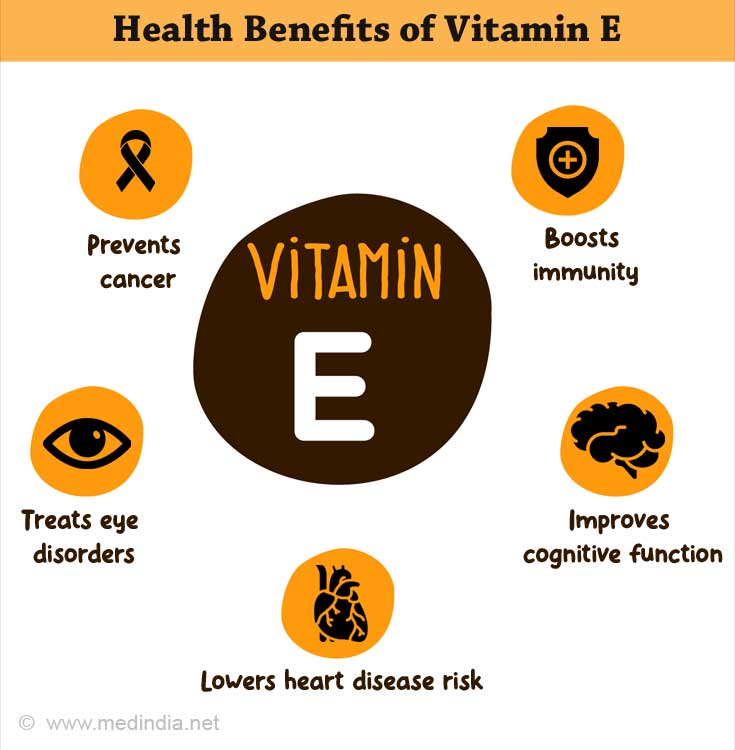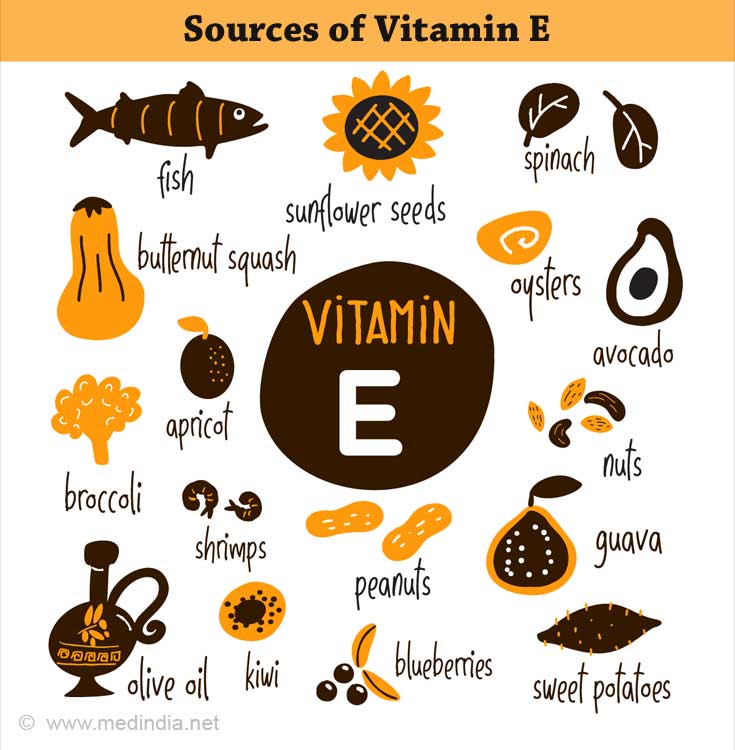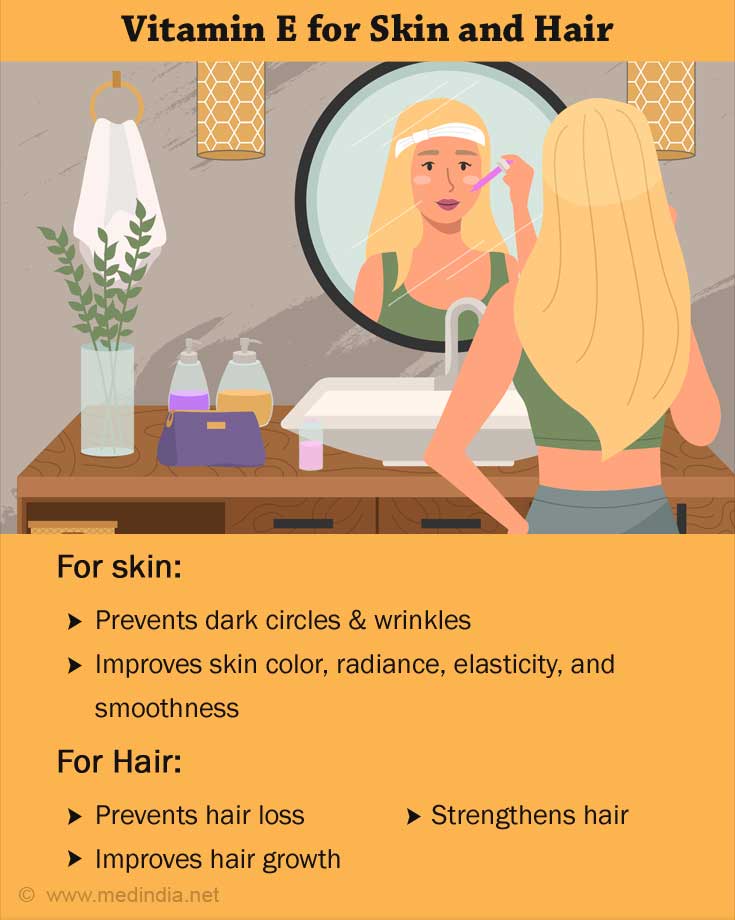- The Role of Vitamin E in Human Health and Some Diseases - (https://www.ncbi.nlm.nih.gov/pmc/articles/PMC3997530/)
- Vitamin E - (https://ods.od.nih.gov/factsheets/VitaminE-HealthProfessional/)
- Tocotrienols: The promising analogues of vitamin E for cancer therapeutics - (https://pubmed.ncbi.nlm.nih.gov/29496592/)
- Vitamin E Deficiency - (https://www.ncbi.nlm.nih.gov/books/NBK519051/)
- Vitamin E - (https://www.mayoclinic.org/drugs-supplements-vitamin-e/art-20364144)
- The Nutrition Source of Vitamin - (https://www.hsph.harvard.edu/nutritionsource/vitamin-e/)
- Keen, M. A., & Hassan, I. (2016). Vitamin E in dermatology. Indian dermatology online journal, 7(4), 311-315. - (https://doi.org/10.4103/2229-5178.185494)
- de Oliveira Pinto, C. A. S., Martins, T. E. A. , Martinez, R. M., Freire, T. B., Velasco, M. V. R., & Baby, A. R. (2021). Vitamin E in Human Skin: Functionality and Topical Products. In P. Erkekoglu, & J. S. Santos (Eds.), Vitamin E in Health and Disease - Interactions, Diseases and Health Aspects. IntechOpen. - (https://doi.org/10.5772/intechopen.98336)
- Effects of Tocotrienol Supplementation on Hair Growth in Human Volunteers - (https://www.ncbi.nlm.nih.gov/pmc/articles/PMC3819075/)
What is Vitamin E?
Vitamin E is a fat-soluble vitamin that is recognized for its powerful antioxidant activities and is classified as tocopherols and tocotrienols. Vitamin E can be obtained exclusively from dietary sources only. This essential vitamin is found in foods that contain fats and is stored in the fatty tissues of the human body. There are eight forms of vitamin E that are synthesized by plants, namely alpha, beta, gamma, and delta classes of tocopherols and tocotrienols. Vitamin E bestows several benefits to human health and aids in the prevention of diseases(1✔ ✔Trusted Source
The Role of Vitamin E in Human Health and Some Diseases
Go to source).
What are the Benefits of Vitamin E?
Vitamin E shines rays of benefits to prevent diseases and promote health.
- Vitamin E known as the antioxidant vitamin aids in reducing oxidative stress caused by free radicals. Oxidation has established associations with detrimental health conditions like cancer, arthritis, cataract, and aging. The vitamin breaks the chain and inhibits the production of reactive oxygen species and acts as the first line of defense in protecting cell membranes. Studies have found that alpha-tocopherol is mainly involved in the inhibition of free radical production while gamma-tocopherol involves in neutralizing the radicals(1✔ ✔Trusted Source
The Role of Vitamin E in Human Health and Some Diseases
Go to source). - Vitamin E benefits in heart health are revealed by many studies. Observational studies have found that a higher intake of vitamin E is coupled with a lower incidence of heart disease. Gamma tocopherol has been shown to augment nitric acid synthase activity thereby increasing the production of vessel-dilating nitric oxide. Tocotrienols aid in turning down the synthesis of cholesterol, a major risk factor for heart disease. Supplementation of vitamin E has been found to reduce the risk of arterial clotting and cardiovascular-related death rates(1✔ ✔Trusted Source
The Role of Vitamin E in Human Health and Some Diseases
Go to source, 2✔ ✔Trusted Source
Vitamin E
Go to source).
- Role of Vitamin E in cancer prevention is well-established as it exhibits protection against free radical damage. It also helps in blocking the production of carcinogenic nitrosamines from foods containing nitrates and also helps boost immunity. Evidence shows that tocotrienols effectively prevent cancers of the brain, blood, breast, colon, cervical, lung, liver, prostate, pancreas, stomach, and skin. Tocotrienols also sensitize cancer cells to chemotherapeutic agents(2✔ ✔Trusted Source
Vitamin E
Go to source, 3✔ ✔Trusted Source
Tocotrienols: The promising analogues of vitamin E for cancer therapeutics
Go to source).

- Eye disorders such as cataracts and age-related macular degeneration (AMD) can be prevented or treated with antioxidant exhibiting nutrients like vitamin E. Supplementing vitamin E along with other antioxidants like zinc and copper are promising formulations for halting the progression of AMD. Studies also found that lens clarity improved with vitamin E supplementation(1✔ ✔Trusted Source
The Role of Vitamin E in Human Health and Some Diseases
Go to source, 2✔ ✔Trusted Source
Vitamin E
Go to source). - Free radical damage to neurons may pave the way to cognitive decline and neurodegenerative diseases. A study conducted among older adults revealed that vitamin E intake from foods or supplements was linked with less cognitive decline. The vitamin may also help in slowing the progression of Alzheimer's disease(1✔ ✔Trusted Source
The Role of Vitamin E in Human Health and Some Diseases
Go to source, 2✔ ✔Trusted Source
Vitamin E
Go to source). - Use of vitamin E for
boosting immunity has been reported by studies. It stimulates the defense mechanisms, phagocytic functions, and cellular immune responses in the body. Higher plasma levels of vitamin E were found to be associated with a reduced incidence of infections(1✔ ✔Trusted Source
The Role of Vitamin E in Human Health and Some Diseases
Go to source). - Vitamin E also shows antiplatelet effects. It inhibits the oxidation of LDLs and brings down prostaglandin E2 thereby preventing platelet aggregation(4✔ ✔Trusted Source
Vitamin E Deficiency
Go to source).
What is Vitamin E Deficiency?
Deficiency of Vitamin E is rare in humans and is caused due to poor intake of the nutrient from diet or defects in absorption and metabolism of fat. Premature babies, patients with cystic fibrosis, Crohn's disease, or abetalipoproteinemia may also experience vitamin E deficiency. An early stage of deficiency displays the following symptoms: reduced night vision, loss of vibratory sense, and hyporeflexia. The moderate stage of deficiency may be characterized by muscle weakness, restricted upward gaze, and limb ataxia. Severe deficiency of vitamin E symptoms includes cardiac arrhythmia, blindness, and reduced cognition(4✔ ✔Trusted Source
Vitamin E Deficiency
Go to source).
What are the Side Effects of Over Consumption of Vitamin E?
An inappropriate dosage of vitamin E can lead to adverse symptoms. Side effects that may rise due to toxicity include nausea, intestinal cramps, fatigue, diarrhea, weakness, blurred vision, headache, rashes, gonadal dysfunction, and high levels of creatine in the urine(5✔ ✔Trusted Source
Vitamin E
Go to source). Animal studies have shown that excessive intake of alpha-tocopherol may cause hemorrhage(2✔ ✔Trusted Source
Vitamin E
Go to source).
What are the Sources of Vitamin E?
Vitamin E-rich foods are mostly plant-based. Wheat germ oil, sunflower oil, safflower oil, soyabean oil, almonds, peanuts, hazelnuts, sunflower seeds, asparagus, mango, avocado, pumpkin, beet greens, spinach, and peanut butter are some of the best food sources of vitamin E.
Supplements of vitamin E available in the market are good swaps when unable to meet the requirement via diet. It is mostly alpha-tocopherol that is found in vitamin E capsules and fortified foods(2✔ ✔Trusted Source
Vitamin E
Go to source, 6✔ ✔Trusted Source
The Nutrition Source of Vitamin
Go to source).

Vitamin E for Skin and Hair
Vitamin E for skin and hair has been studied by many and positive effects have been reported.
- Vitamin E protects the skin from the detrimental effects of solar radiation by scavenging free radicals. The topical application of vitamin E is used in the treatment of surgical scars, wounds, and burns. Anti-aging creams have vitamin E added to them for their antioxidant and skin-benefiting properties. Vitamin E is also effective against dark under-eye circles. Topical usage of vitamin E capsules on the face helps reduce ultraviolet B-rays-induced wrinkles and sparks up the production of collagen. In-vivo studies showed that vitamin E serum improved skin color, radiance, elasticity, and smoothness(7✔ ✔Trusted Source
Keen, M. A., & Hassan, I. (2016). Vitamin E in dermatology. Indian dermatology online journal, 7(4), 311-315.
Go to source, 8✔ ✔Trusted Source
de Oliveira Pinto, C. A. S., Martins, T. E. A. , Martinez, R. M., Freire, T. B., Velasco, M. V. R., & Baby, A. R. (2021). Vitamin E in Human Skin: Functionality and Topical Products. In P. Erkekoglu, & J. S. Santos (Eds.), Vitamin E in Health and Disease - Interactions, Diseases and Health Aspects. IntechOpen.
Go to source). - Vitamin E also exhibits advantageous effects on hair. Vitamin E can be considered an effective treatment for hair loss in alopecia. Supplementation of tocotrienol capsules among people suffering from hair loss resulted in increased hair numbers. This could be due to its antioxidant effects on the scalp(9✔ ✔Trusted Source
Effects of Tocotrienol Supplementation on Hair Growth in Human Volunteers
Go to source).

Bottom Line
Vitamin E is a vitamin that possesses superpowers, be it dietary intake or topical usage, its benefits are numerous. Consuming this micronutrient in adequate quantities shines macro benefits to human health.









